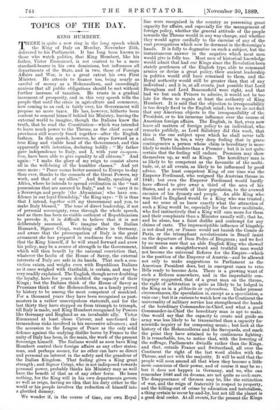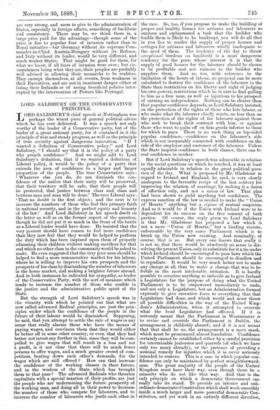TOPICS OF THE DAY.
KING HUMBERT.
THERE is quite a new ring in the long speech which the King of Italy on Monday, November 25th, delivered to his Parliament. It has long been known to those who watch politics, that King Humbert, like his father, Victor Emmanuel, is not content to be a mere standard-bearer in his own dominions, but influences all departments of the State, and in two, those of Foreign Affairs and War, is to a great extent his own First Minister. He attends to finance too, being nearly as careful of money as a Hohenzollern, and exceedingly anxious that all public obligations should be met without further increase of taxation. He trusts in a gradual increment of prosperity, and in this very speech tells the people that until the crisis in agriculture and commerce, now coming to an end, is fairly over, his Government will propose no more taxes. He has, however, hitherto been content to conceal himself behind his Ministry, leaving the external world to imagine, though the Italians knew the truth, that he read the Constitution—which was intended to leave much power to the Throne, as the chief nexus of provinces still scarcely fused together—after the English fashion. In this speech, however, he steps forward as a true King and visible head of the Government, and this apparently with intention, declaring boldly : "My father gave independence to Italy, and I, with your co-opera- tion, have been able to give equality to all citizens." And again : "I make the glory of my reign to consist above all in the well-being of the humbler classes." And yet once more : "Peace seems better assured to Europe to-day than ever, thanks to the counsels of the Great Powers, my work, and that of my allies." And finally, speaking of Africa, where he intends to spread civilisation in the "vast possessions that are assured to Italy," and to "carry it to a Sovereign and people [the Abyssinian] who have con- fidence in our loyal friendship," the King says : "It is thus that I intend, together with my Government and you, to make Italy blessed." The tone of direct leadership, if not of personal sovereignty, runs through the whole speech, and as there has been no visible outburst of Republicanism to provoke it, it is difficult to believe that it is not deliberately assumed. We imagine that the Italian Bismarck, Signor Crispi, watching affairs in Germany, and aware that the preoccupation of Italy is the great armament she has prepared in readiness for war, thinks that the King himself, if he will stand forward and avow his policy, may be a source of strength to the Government, which will then benefit by the national conviction that, whatever the faults of the House of Savoy, the external interests of Italy are safe in its hands. That such a con- viction exists, and weighs even with Republican Italians as it once weighed with Garibaldi, is certain, and may be very readily explained. The English, though never doubting the loyalty, have for years doubted the capacity of their Kings ; but the Italians think of the House of Savoy as Prussians think of the Hohenzollerns, as a family proved by history to be among the most competent of mankind. For a thousand years they have been recognised as past- masters in a rather unscrupulous statecraft, and for the last thirty they have stepped on from triumph to triumph, till Italy is made, and King Humbert recognised by Powers like Germany and England as an invaluable ally. Victor Emmanuel at least chose Cavour, and sanctioned the tremendous risks involved in his successive advances ; and the accession to the League of Peace as the only solid defence against the undying dislike borne by France to the unity of Italy has been, in the main, the work of the present Sovereign himself. The Italians would as soon have King Humbert control their foreign affairs as any other states- man, and perhaps sooner, for no other can have so direct and personal an interest in the safety and the grandeur of the Italian Kingdom. That feeling gives a King great strength ; and Signor Crispi, who is not indisposed towards personal power, probably thinks his Ministry may as well have the benefit of that as of any other force. He loses nothing, for the King will in his own departments govern as well as reign, having no idea that his duty either to the world or his people involves the reduction of himself into a glorified dummy.
We wonder if, in the course of time, our own Royal line were recognised in the country as possessing great capacity for affairs, and especially for the management of foreign policy, whether the general attitude of the people towards the Throne would in any way change, and whether they would agree cordially to the exercise of any of the vast prerogatives which now lie dormant in the Sovereign's hands. It is folly to dogmatise on such a subject, but the- instantaneous answer in the negative which most men would give is folly too. Most men of historical knowledge- would admit that had our Kings since the Revolution been stately gentlemen of the English type, able to command armies or devise a great policy, their ancient leadership. in politics would still have remained to them, and the Royal authority would still be greater than that of any- individual ; and it is, at all events, just possible that Lord Brougham and Lord Beaconsfield were right, and that had we but such Princes to admire, it would not be too late for them to regain at least the authority of King Humbert. It is said that the objection to irresponsibility is too deeply fixed in the English mind ; but we do not find. that any American objects to the irresponsibility of the President, or to his immense influence over the course of American foreign affairs. The English, in fact, even now leave all matters of foreign policy to an individual, who. remarks publicly, as Lord Salisbury did this week, that this is the one subject upon which he shall never talk aloud. There is, too, a very deep feeling that in grave contingencies a person whose claim is hereditary is more- likely to make blunders than a Premier ; but it is not quite. certain that the feeling will endure. Premiers may show themselves up, as well as Kings. The hereditary, man is as likely to be competent as the favourite of the multi- tude, or, at all events, as likely to be influenced by good advice. The least competent King of our time was the Emperor Ferdinand, who resigned the Austrian throne in 1848; but even the Emperor Ferdinand would hardly have offered to give away a third of the area of his States, and a seventh of their population, to the avowed enemies of his dynasty and people. An able King who. was liked in England would be a King who was trusted - and we none of us know exactly what the attraction of such a King would be, especially for the lower multitude,. who feel instinctively that a King will care more for them and their complaints than a Minister usually will ; that he,. and he alone, has a faint dislike and contempt for any claims of caste. The imprescriptible influence of kingship is not dead yet, or France would not banish the Comte de Paris, or the triumphant revolutionists in Brazil insist on the departure of Dom Pedro of Braganza ; and we feel by no means sure that an able English King who showed' himself also a straightforward and truthful man would not become the universal Referee for the Empire—whith is the position of the Emperor of Austria—and be allowed not only to make suggestions to Parliament as the American President does, but in emergent cases to veto. Bills ready to become Acts. There is a growing want of such a Referee somewhere, and in the improbable con- tingency suggested, that of a great man on the throne, the right of arbitration is quite as likely to be lodged in the King as in a plebiscite or referendum. Under present circumstances, the speculation is, except as a. speculation, a vain one ; but it is curious to watch how on the Continent the universality of military service has strengthened the hands of the hereditary Commander-in-Chief, and what a good Commander-in-Chief the hereditary man is apt to make. One would say that the capacity to create and guide an army was less likely to be transmitted than a capacity for scientific inquiry or for composing music ; but look at the history of the Hohenzollerns and the Savoyards, and mark the point they have attained to by continuous fighting. It is remarkable, too, to notice that, with the lowering of the suffrage, Parliaments dwindle rather than the Kings,. and that, outside France and Switzerland, all over the- Continent the right of the last word abides with the Throne, and not with the majority. It will be said that the people will soon amend all that when they become a little- more conscious of their power, and of course it may be so ; but it does not happen in Germany, and we, who can remember 1848 and its dreams, are not quite so cock-sure. The disappearance of thrones may be, like the extinction of war, and the reign of fraternity in respect to property, and the killing-out of crime by education and teetotalism, a thing certain to' occur by-and-by, but not till the planet is a good deal cooler. At all events, for the present the Sings are very strong, and seem to give to the administration of States, especially in foreign affairs, something of backbone and consistency. There may be, we think there is, a large price paid for the advantage—though some of the price is due to popular fear of invasion rather than to Royal initiative—but Germany without its supreme Com- mander-in-Chief, Austria-Hungary without its Referee, and Italy without its leader, would be very different, and much weaker States. That might be good for them, for what we know, if all fears of invasion were over ; but cir- cumstances being what they are, their peoples are probably well advised in allowing their monarchs to be realities. They exempt themselves, at all events, from weakness in their Executives, and are not in imminent danger either of losing their Irelands or of seeing beneficial policies inter- rupted by the intervention of Powers like Portugal.







































 Previous page
Previous page